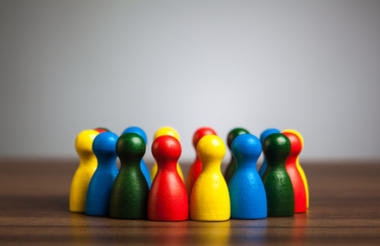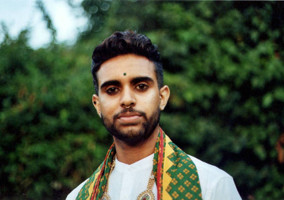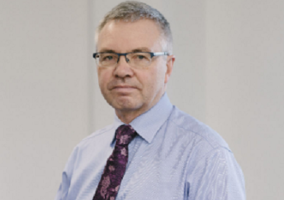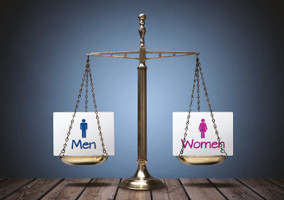When you imagine a conversation on gender - whom do you imagine speaking? Whom do you imagine in the audience?
Most would envision a panel of almost all women speaking to a room of almost all women. And, if you’ve attended more than one such panel, you know it is inevitable that a moderator or a speaker will make a hollow joke about what the opposite of a manel is or how great it is to see a couple of men listening in as an unimpactful nod to male inclusion.
While the lack of meaningful inclusion and participation of men in these conversations cannot be understated, those in the room tend to ignore a number of very particular, very relevant communities who have their own perspectives to add. In a conversation that is supposedly about gender, the acknowledgement, experience, and perspective of everyone else is disappointingly absent. Where are the trans folx, indigenous gender identities, and agender, nonbinary, and genderfluid people?
The sector must let go of gender binaries in order to structurally address gender inequality. Gender-based discriminatory arguments rely on a strict adherence to a gender binary, so including trans, nonbinary, and other gender minorities in gender work is fundamental to combating patriarchy, sexism, and other gender-based ills.
Within a gender binary framework, men act like and do this, and women act like and do that; there cannot be overlap, and there are social structures to reinforce and enforce this artificial bisection. But acknowledging and including people with identities beyond cis-male and cis-female shifts the paradigm in a way that naturally deconstructs the basis of a gender binary mindset. And if the idea of the binary itself comes into question, gendered ideals, stereotypes, and roles fall apart.
Gender is about far more than just the experiences and realities of women and girls
There is a burgeoning recognition that all white leadership and panels are no longer acceptable and, more importantly, that they are not legitimate.
Transferring this same logic to gender, if it is no longer tactful for an international development organisation to sponsor a panel of white armchair experts on development in West Africa, why would it be acceptable for a gender organisation to create a panel of only women to talk about gender in that same region?
In both cases, the problem is not that these people do not have information to share. The problem is that particular groups of people who are very much involved and affected by the issues being discussed are excluded, thereby creating a conversation that is unlikely to acknowledge, let alone reflect upon, nuances that are fundamental to adequately and sustainably addressing common concerns and needs.
Organisations that advertise their work with the ‘gender’ label when they really just mean ‘women’ or ‘girls’ beg the question - is their erasure purposefully malignant in their exclusion and reduction or is it accidentally malignant in their specific lack of understanding about the very topic they claim to know well enough to lead programming or advocacy on?
Now, this is not to say that panels that consist of only women or organisations that work only with girls are problematic. Not at all, in fact. Women and girls face unique situations and challenges that others do not. But, that programming isn’t about gender as it is broadly defined; it’s about women and girls. While some may see this difference as merely pedantic, gender is about far more than just the experiences and realities of women and girls. It is about the experiences and realities that individuals - cis, trans, nonbinary, and more - face as a function of their gender identity and expression.
Properly describe the issues addressed and communities served
Organisations need to properly describe the issues they address and communities they serve without relying on a minimising heuristic that narrows something as universally but uniquely experienced as gender to just one subset of the population.
If an organisation specifically works with women, it is more accurate to say they work on women’s issues rather than gender issues. If someone claims to be a gender consultant but has no understanding of how trans people experience and express gender, they are lacking a fundamental perspective of gender and cannot claim expertise on the subject.
More broadly, this means that, if organisations want to commit to gender-focused work and advocacy, they must expand their programming and advocacy beyond just women and girls. At the same time, there is a very reasonable alternative to committing to gender work: rebranding the work as specifically for women and / or girls.
While such a change undoubtedly takes some combing through of policy documents and website pages as well as internal revisions to how staff members talk about their work, a rebrand along these lines would be a more accurate representation of the work and would be a step towards a more multifaceted - and inclusive - understanding of gender.
Opening people up to harm
When organisations claim that they work on gender issues, but then do not have the corresponding staff training, organisational policies, and programmatic considerations, they continue the erasure of gender minorities and often open up these individuals to harm.
If a nonbinary person walks into a health centre that claims itself to be the leading local resource for those experiencing gender-based violence, and the staff aren’t prepared for the possibility that someone other than a cis-woman will walk in, those running the centre are setting that person up to be harmed once again - through refusal of services, through conscious or unconscious discrimination, through public outing, and more.
Statistic after statistic show that i) gender minorities are more likely to experience violence than cis-women and ii) men also experience violence. So, if you advertise your work as addressing gender-based violence, you have to be ready to serve, represent, and do no harm to the genders whom you forgot about when substituting the phrase “gender-based violence” for “violence against women” as a way to use flashy, hip jargon to get donors’ attention and money.
Circling back to the safety and familiar comfort of mostly-female gender conferences and webinars, there is a truism that is often shared: “gender work isn’t just for women.” As truisms go, the statement is absolutely correct, so everyone nods in agreement. Yet, there is a largely unrecognised irony in those words. The speaker usually means, and is usually understood as meaning, “men also need to care about women’s issues.”
In the future, I hope this phrase will be understood in a different way, with an emphasis on the fact that gender work isn’t just for women. It is for us all.
Katie Fuhs has worked with a number of nonprofits in the international development sector. As the operations and programmes officer for Accountability Lab, she supports the operational management of the Lab’s translocal network across sub-Saharan Africa, South Asia, and North America as well as the implementation, facilitation, and oversight of youth events and advocacy at the global level. Concurrently, Katie is the lead organiser for the Open Gov Youth Collective, which aims to highlight and include youth voices in the global open government movement. Katie also sits on the Global Fund for Children’s Youth Leadership Council, ensuring that young people inform the fund’s grantmaking, advocacy, and development strategies.
Related articles












